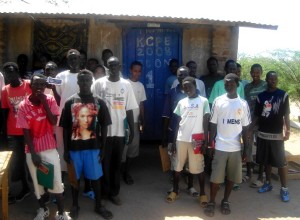
Volume 1, Issue 1 / December 2008
In September 2007, a tripartite agreement was signed between the Government of Southern Sudan, the UNHCR, and the Governments of Kenya, Uganda, and Ethiopia. The Tripartite Agreement allowed for Sudanese refugees were to be repatriated back to their country on a voluntary basis.
The Tripartite Agreement also stated that the schooling of Sudanese pupils was to be scaled down in order to “guide the repatriation and re-integration of Southern Sudanese refugees into Southern Sudan” (UNHCR Notice posted in Kakuma Refugee Camp). This meant that as of January 2008, Sudanese students were not allowed to enroll in class one (the first year of primary school) or form one (the first year of secondary school). Those Sudanese students proceeding from form two to form three were limited to the top 15 boys and 15 girls in the class. The maximum age for any Sudanese learner in primary school was reduced to 17 years, with an exception for learners in the Candidate Class in both primary and secondary school.
Since January 2008, UNHCR has assisted in the repatriation of approximately 8,167 refugees to different states in Southern Sudan (UNHCR Fact Sheet, September 2008). Reflecting these trends, the number of primary schools in Kakuma refugee camp has been reduced to14 from 21 since November of last year. The number of secondary schools has been reduced from three to two. Staff turn-out has also been problematic because a majority of Sudanese teachers have gone for repatriation.
A number of shortcomings are visible as the 2008 academic year comes to a close. A good number of last years’ class eight Sudanese learners did not get accepted to vacancies in Kenyan secondary schools as they could not afford fees. The majority of pre-school graduates are also stranded in the camp having had no opportunity to join class one. A few guardians have managed to doctor school progress records for their children to remain in school. This is quite visible where a sizable number of class two learners in secondary schools cannot cope with the academic standards.
In the recently concluded Kenya Certificate for Primary Education (KCPE) exams, most Sudanese candidates were not quite determined to pass as their future education is uncertain. Says one Sudanese KCPE candidate, Michael: “I’m not willing to go for repatriation and I think I’ll join a Kenyan school if I don’t get a chance at form one in the camp. Before going home to Sudan, I wish to wait until 2011 for the referendum in Southern Sudan because this could change the political situation for a better change.”
With the looming repatriation exercise expected to start again soon, the education of Sudanese youth who are not yet ready to return home remains uncertain. “It’s disturbing me and we are really hopeless because there’s no form one for Sudanese,” explains Sunday William after sitting for his KCPE exam. “I came here because of the war in Sudan, knowing that if I can continue my education it will help me in my future life. So now this policy is really stressing me.” Fellow student Simon Ohide agrees: “I’m worried why UNHCR wants me to go back to Southern Sudan, yet I’m not willing.”
